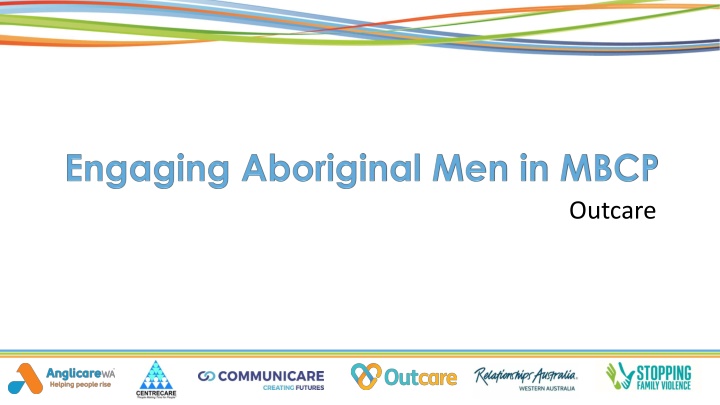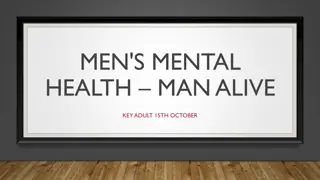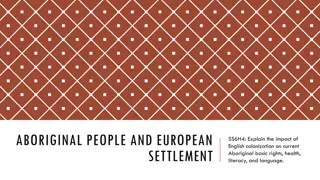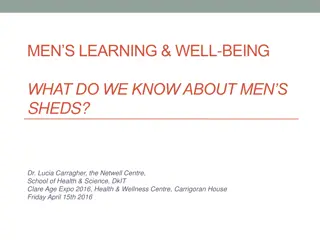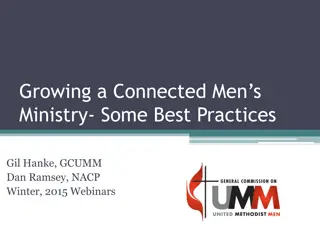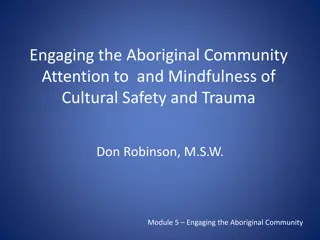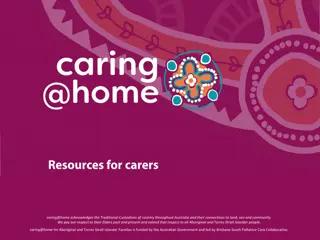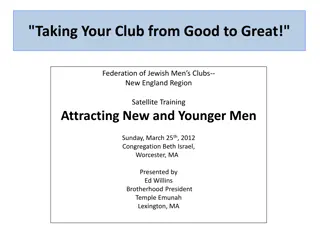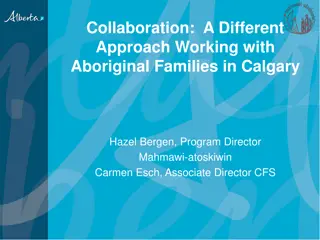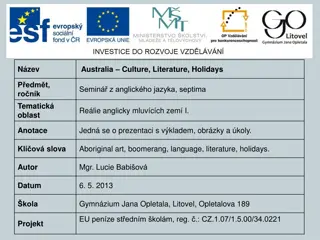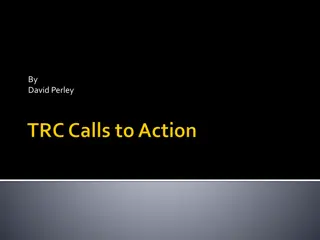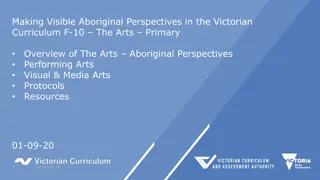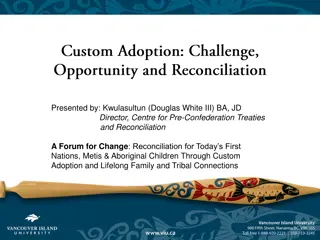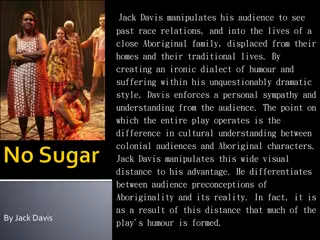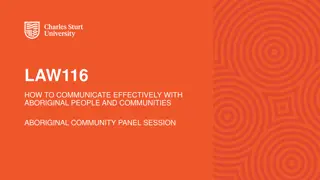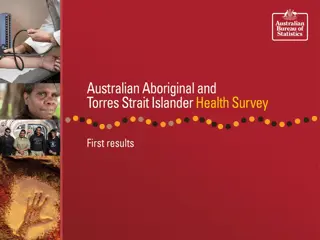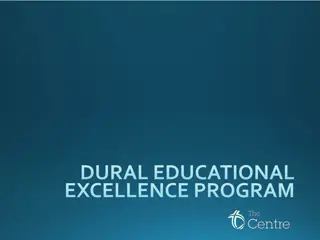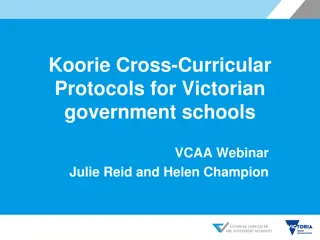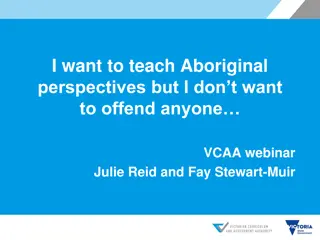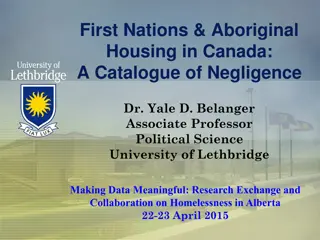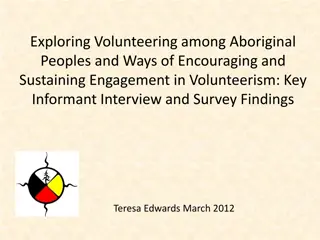Insights on Engaging Aboriginal Men in FDV Program
Providing valuable insights and context on effectively engaging Aboriginal men in a Family and Domestic Violence (FDV) program. The program focuses on increasing safety for victims and children, working with 49 Aboriginal men since March 2017, and offering psycho-educational group sessions to address abuse patterns and control behaviors. Through cultural integrity and responsive approaches, the program aims to empower participants to live safe, abuse-free lives.
Download Presentation

Please find below an Image/Link to download the presentation.
The content on the website is provided AS IS for your information and personal use only. It may not be sold, licensed, or shared on other websites without obtaining consent from the author.If you encounter any issues during the download, it is possible that the publisher has removed the file from their server.
You are allowed to download the files provided on this website for personal or commercial use, subject to the condition that they are used lawfully. All files are the property of their respective owners.
The content on the website is provided AS IS for your information and personal use only. It may not be sold, licensed, or shared on other websites without obtaining consent from the author.
E N D
Presentation Transcript
Acknowledgement We would like to acknowledge the Wadjuk people from the Noongar nation who are the traditional owners of this land on which we are meeting today. We would also like to acknowledge the traditional custodians of this land, the Noongar people, and pay my respects to their Elders past, present and emerging, for they hold the memories, traditions, the culture and hopes of Aboriginal Australia
Introduction Our team will provide you with invaluable insights and context on what is currently working with our FDV Program in Engaging Aboriginal Men in MBCP s Our FDV Program team consists: of Case managers: Mary Lynch, Lennon Marlin, Nina Aramoana; Counsellor: Tucker Christou and Peer Worker: Max Kelly. Leadership learnings include: Cultural Integrity Cultural Responsibility Cultural Capacity Building Cultural Responsive Recruitment strategy
Statistics Aboriginal and Torres Strait Islander people make up over 2.8% of Australia's population Aboriginal people currently make up 30% on Nationwide prison population More than 500,000 Australians still living have been to prison - More than 100,000 First Nations people contribute to this statistic - 1 in 7 First nations people have experienced prison (Source- Gerry Georgatos) Acacia Prison - Total detainee population; 1526 - First Nations detainee population; 463
Synopsis of Program The primary aims of this program are to increase the safety of victims and children A Voluntary MBCP designed to work specifically with Aboriginal men We have had 49 Aboriginal men deemed suitable and engaged in the program since March 2017 Connecting him to his capacity and skills for living a safe and abuse free life A Psycho Educational group setting Each session provides an opportunity to learn how the abuse pattern started, ways that thought patterns fuel the need to control others, the internal permissions that allows abuse
Synopsis of Program Every session teaches him to listen, observe, share stories, learn and be safely and respectfully challenged. He is invited into opportunities to listen to others talking through experiences which can enable a deeper understanding: Of the abuse dynamic What has brought him to make these choices Importantly, strategies for change building a toolkit of skills Unique to this program is the connection to mind, body and spirit
Whole Body Engagement Cultural Capability NOT Cultural Competence, through Acknowledgment, Empathy, Understanding and Passion Knowledge of Family Violence Understanding of aboriginal specific links to Family Violence Female Perspective Head Non-Judgement of the life path and recognition of the past Dignity and Worth Separating the behaviour from the person Eyes Build Rapport through Active Listening Person Centred He is the expert on himself Disclosure of trauma Ears
Whole Body Engagement Respectfully Challenge Continuous Reinforcement Real Life Practical Examples Using Aboriginal English Mouth Understanding of Hand Gestures Practical Support Hands Empathy Spiritual Awareness Heart Walking with these men on their individual journey s Supportive Feet
Whole Body Engagement
Counselling Component Initially as part of the group work there was six one to one counselling sessions with a qualified counsellor skilled in working with Family Domestic Violence. This has now changed due to the counselling sessions identifying such high levels of: Childhood abuse Intergenerational trauma Drugs and alcohol abuse Cultural vouching Aboriginal male co-facilitator To build respect & trust, but never taking this for granted It s not a black thing but a human thing
In Closing MBCP s are instrumental in working with Aboriginal men. The programs allows challenging learning and growth experiences to assist them to become empowered men. To date our FDV program has demonstrated a shift in healing and empowerment journey with those who make a renewed commitment to keeping their women and children safe. Additionally, the base line statistics that case manager: Lennon has reflected on with the over representation of Aboriginal men are damning. MBCP s going forward: o Cultural Respect o Successful Engagement and Responding to Challenges o MBCP s maintain partnerships o Cultural Confidence
